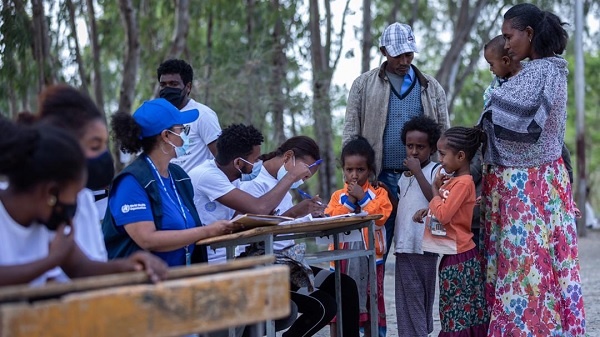
MEKELLE (WHO Africa) – Ethiopia officially launched, 12th June 2021, a preventive oral cholera vaccination campaign targeting 2 million people aged 1 year and above in Tigray region in the north of the country to avert a potential outbreak.
The vaccination drive, which began on 10 June, will cover 13 priority districts in Tigray and is being carried out alongside measures such as provision of water purification tablets and handwashing soaps to improve water, sanitation and hygiene.
The Ethiopian Public Health Institute (EPHI) and the Tigray Regional Health Bureau are leading the cholera vaccination campaign, with logistical support from the Ethiopian Pharmaceutical Supply Agency, and technical and operational support from World Health Organization (WHO) and partner organizations.
Planning for the campaign was led by the Tigray Regional Health Bureau, with WHO providing technical guidance, while the vaccines were provided by the International Coordinating Group (ICG) on Vaccine Provision through the Global Taskforce for Cholera Control (GTFCC) with funding of the operational cost by GAVI, the Vaccine Alliance. WHO also facilitated the request, procurement and shipment of the vaccines.
“In addition to WHO’s role in the procurement and deployment of the vaccine doses, WHO teams have been working with our teams providing technical, operational and logistical support. I commend the unreserved support and look forward to our continued partnership to ensure the health and safety of the people of Tigray,” said Dr. Fasika Amdeselassie, head of the Tigray Health Bureau.
- See also: Africa is declared polio-free ― one of the greatest public health achievements in the continent
Vaccinators trained by the Regional Health Bureau, EPHI and WHO are going through communities and camps for internally displaced persons administering the vaccine in the first-round of the campaign in Tigray, one of Ethiopia’s regions prone to seasonal cholera outbreaks.
“The oral cholera vaccine is one of the proven preventive measures that can help avert needless sickness and death if done in a timely manner,” said Dr. Boureima Hama Sambo, WHO Representative in Ethiopia. “WHO is working closely with the Tigray Regional Health Bureau to restore the health system, including the capacity to prevent and respond to possible disease outbreaks.”
Following the conflict that erupted in Tigray at the end of 2020, more than 2 million people have been displaced, with over 1.7 million of them within the region. The crowded living conditions in camps for internally displaced persons, inadequate sanitation, scarcity of clean water and the upcoming rainy season put both the displaced and the host communities at risk of a cholera outbreak.
Cholera is a highly contagious disease transmitted through contaminated water or food. It causes severe diarrhea and dehydration that must be treated immediately to prevent death, which can occur in just a few hours, and to prevent the disease from spreading on a large scale in a high-risk environment. Disease surveillance, improved water, sanitation and hygiene services as well as treatment and vaccines are crucial in preventing cholera and containing infection spread. Coverage with a full two-round dose of oral cholera vaccine provides up to a five-year protection.
Source: WHO Africa
